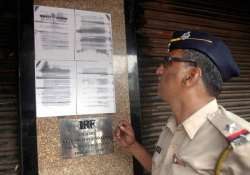Zakir Naik slams government, dubs ban on Islamic Research Foundation a ‘communal decision’
Days after the NIA declared Zakir Naik’s NGO Islamic Research Foundation (IRF) illegal, the controversial Islamic preacher has called the ban on his NGO ‘a communal decision’.

Days after the NIA declared Zakir Naik’s NGO Islamic Research Foundation (IRF) illegal, the controversial Islamic preacher has called the ban on his NGO ‘a communal decision’.
In an open letter to India, released on Friday through his spokesperson, Naik said that IRF was banned without any agency questioning him and that the move was an attack on ‘Muslims, peace, democracy and justice’.
"...not a single time was I questioned or given a chance to explain. Their agenda is open and clear: implicate me by hook or by crook," he said in the letter titled 'Facing The Foregone Conclusion'.
The letter also alleged that the ban was timed with the demonetisation fiasco to avert resistance and divert media attention.
"The decision to ban IRF was taken in the middle of the demonetisation fiasco, as the country reeled under the self-imposed cash crunch. I won't be surprised if this ban was meant to distract media from what was going on in the country," he further writes in the three-page letter.
Naik further asked why the Unlawful Activities Prevention Act (UAPA) does not apply to BJP MP Yogi Adityanath and right-wing leader Sadhvi Prachi, who are also seen making inflammatory speeches.
This was Naik’s second communication since being accused of radicalising one of the perpetrators of the July 1 Dhaka cafe attack.
Naik, 51, presently staying at an undisclosed location abroad, issued the statement in response to the Centre's five-year ban on IRF on November 15 and declaring it a terror outfit under the UAPA.
Declaration of the IRF as an ‘unlawful’ outfit under Section 3 of the UAPA facilitates the government to close its offices and interests across the country.
The ban comes after the government allegedly found the Islamic preacher to be involved in utilising funds meant for his non-government organisation for radicalisation of youths, Union Home Ministry sources had said.
Naik said, "It is now proven that the decision to ban the IRF was taken months ago and it is a communal decision. Before investigations were done, even before reports submitted, the ban was already decided. The IRF was to be banned. Whether it was owing to my religion, or some other reason, it does not matter."
He said that his completely lawful work of the past 25 years has been banned, ‘which is most unfortunate for India’.
For the past few days, Naik's activities were being probed by the National Investigation Agency (NIA). Complaints have been lodged against him under the IPC and the UAPA.
The televangalist claimed the ‘country's democratic fabric is under attack. People's lives are being played with and the Narendra Modi government is misusing law to scare Indian Muslims’.
"The governments are misusing authority on people they're supposed to protect. This needs to change. It needs to change for the future of everyone of us. I have faith in the judiciary. I still believe that truth will prevail and the Modi government will fail in its plans. I will fight this ban, come what may, with all legal options to repeal it," Naik said.
Naik is currently out of the country, and reportedly believed to be somewhere in Africa.
Away from India since the past few months, the controversial evangelist did not come to attend the funeral of his father Abdul K. Naik, who died on October 30.
Naik and the IRF are under the scanner of Indian agencies for alleged misdeeds, spreading or promoting communal disharmony, inciting feelings of enmity between communities and inspiring or supporting terror acts.